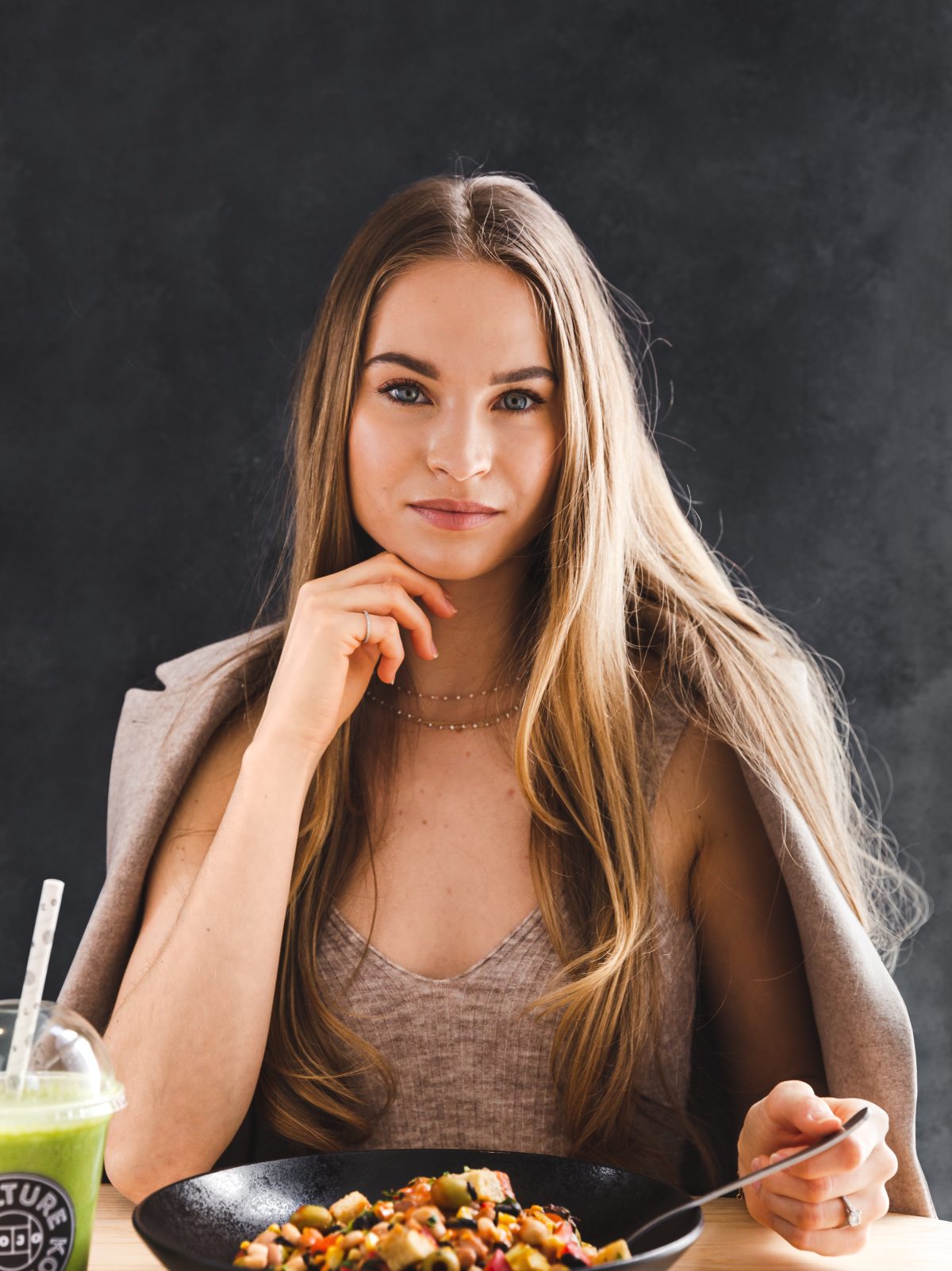About Time You Met: Alina Gromova-Jones, Co-Founder of KOJOBy Angelica Malin
KOJO is a new plant-based eatery, launched by Nobu London Portman Square executive chef Michael Paul and nutritional therapist Alina Gromova-Jones. Open last year in Hampstead, the team have recently added a second outpost to its roster with a takeaway branch in Liverpool Street. We chatted to Alina about launching the business during the pandemic, KOJO’s sustainability ethos and what’s next:
Where did the inspiration for KOJO originate and how did you start the company?
 I had four goals in the back of my mind whilst completing my Nutritional Therapy Degree. One of them was to create a little organic coffee shop serving plant-based, gluten-free, refined-sugar-free cakes and bakes. It was going to be minimalistic, full of plants and dog-friendly, of course.
I had four goals in the back of my mind whilst completing my Nutritional Therapy Degree. One of them was to create a little organic coffee shop serving plant-based, gluten-free, refined-sugar-free cakes and bakes. It was going to be minimalistic, full of plants and dog-friendly, of course.
At the beginning of the pandemic, my husband and I saw the perfect moment to open KOJO. We were given a few odd looks, “Why would you open during a pandemic?”, but it was the best time for us! We found a site that meant a lot to us and before we knew it we were building KOJO. What mostly inspired us to create such a brand was that I wanted to share what plant-based eating was for us, make it approachable and welcoming for everyone, but also provide some education around how eating plant-based does good for your health and benefits the planet too.
My outlook on diet and lifestyle changed when I realised it was the answer to supporting my health conditions. What then seemed like a challenge to change, now is my permanent lifestyle and I have never felt more healthful and vibrant.
The other three goals I had for when I finished my degree are projects pending, stay tuned!
What was it like launching a restaurant during a global pandemic?
Whether we opened during a pandemic or before, it was our first venture into this industry and it was tough! There was always something happening, whether it was having to pick up shipments in our car ourselves or hold interviews for staff in the basement, where works had already finished even though there was still a construction site upstairs. I can say that there were bright moments like suppliers were really keen to work with us because of what we were doing, but also because we were a new customer. I can also say we were lucky with our management staff, had it not been for our core team, I don’t think KOJO would be where it is now and growing!
What was most difficult was that we were stubborn when it came to certain things. We just wouldn’t settle for ‘business as usual’, we wanted to create change in the industry, choosing biodegradable cling-film over the plastic version and delaying our opening an extra week because we had chosen sustainable materials for our sofa cushions and KREW uniform. The hospitality industry is quite unsustainable, and we knew we would just be adding to the problem if we went ahead and compromised on our beliefs. It took our KREW some getting used to, since the kitchen was set up with 8 separate waste bins, no cling-film, compostable cleaning cloths and other eco-friendly measures.
Tell us about the KOJO KOLTURE?
KOJO is more than just a restaurant and food service business, it’s a movement. The KOJO Kolture is the universal expression of that movement. With our KOLTURE brand, we wanted to highlight a new kind of lifestyle, a plant-based diet, a consciousness around environmental issues and an awareness for societal matters encompassing our everyday. From the art on our walls, down to the beats we play—the approach is different and designed for the ‘koltured’ consumer who is equally concerned about the environment as they are the food and experience.
What does KOJO do to be sustainable?

The big one, we’re 100% plant-based! We work with suppliers who share our sustainable beliefs, using local produce that has had minimal chemical intervention, using less plastic packaging, giving back to the planet and local initiatives, and choose organic wines and spirits that are climate positive. We choose cans or glass over plastic. We use planet-friendly cleaning chemicals and materials. We use staple-less staplers, refillable pens, eco-friendly tape in our offices. We do what we can and even then, it doesn’t seem enough. We’re always on the lookout for new innovations and how we can improve on what we’re currently doing.
Tell us about the menu. What’s your favourite dish?
KOJO is 100% plant-based and is inspired by whole foods and Asian flavours. There’s something for everyone, even children love eating at KOJO; from Matcha Pancakes for Breakfast to Goma Ramen for dinner. My favourite dish is the Bali Blossom Noodle Salad, it’s soba noodles, with edamame, carrots, beetroot and spinach with the most amazing sauce. It’s garlicky with almond butter and sesame oil, so creamy. Everyone comments on how unexpected the flavours are!
What does the future look like for KOJO?
BIG. We will continue to serve delicious and nutritious food. We want to provide more educational tools for people, whether it’s education around nutritious eating and cooking or highlighting environmental issues concerning our planet and life on earth. We want to continue kollabing with creatives and artists to bring that spice to our locations.
What do you think of the plant-based scene in London?
I have been to a few pubs outside of London recently and they have stepped up! So many plant-based choices and at least one dish on the menu doesn’t come from ‘Frankenstein’ foods and is full of veggies! The London scene can learn a thing or two! I would love to see more places offer whole foods and well cooked, well-seasoned vegetables rather than fake meats and indistinguishable ‘plants’. A little PSA: “Think about the plant-based eaters of the city, we want good food when we go out for a meal too!”

